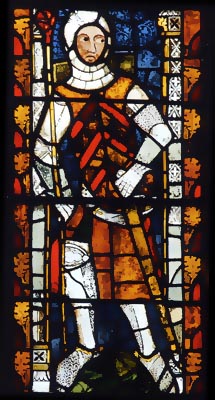 |
 |
|||
|
|
 Gilbert
'the Red' De Clare, Gilbert
'the Red' De Clare,Earl of Gloucester (1243-1295) Born: 2nd September 1243 at Christchurch, Hampshire Earl of Gloucester Earl of Hertford Died: 7th December 1295 at Monmouth Castle, Monmouthshire Gilbert was nicknamed the 'Red
Earl' after the colour of his hair. He was the eldest son of Richard de
Clare, Earl of Gloucester & Hertford and Margaret de Lacy, the Countess
of Lincoln. After his father's death in 1262, Gilbert, still a minor,
inherited vast estates in the West Country, the Welsh Marches and Ireland.
He took possession the following year.
During Simon de Montfort's Rebellion of 1263-4, Gilbert
was, initially, a keen supporter and he and his brother were knighted by the
Earl shortly before the Battle of Lewes. However, being the two most
powerful men in the country, a clash was inevitable. Gilbert was greedy for
the spoils of victory, including additional authority in the government and
a degree of independence for his vast estates. He therefore stood up as a
defender of the 'Provisions of Oxford' - his father's initiative to
establish a proto-parliament - and inferred that De Montfort's despotism was
betraying its principles. In May 1265, Gilbert split from the De Montfort
party and allied himself with the newly escaped Prince Edward, for whom he
won the Battle of Evesham. However, while the surviving followers of De
Montfort thought him a traitor, Gilbert's relationship with the Royalist
party was hardly less strained.
He became a champion for disinherited rebel sympathizers
and protested at the lack of implementation of the 'Provisions of Oxford',
even though the Royal victory rendered these redundant. With constitutional
restraint and decency as his watch words, Gilbert seems to have hoped to
exercise a detached role in English political life. When he found this
impossible, he raised an army in 1267 and took over the city of London. His
grievances were then placed before the arbitration of Richard,
Earl of Cornwall. To all the World, Gilbert thence appeared
reconciled with the establishment, but discontent was still festering.
Gilbert took up the cause of the Cross in 1268 and
promised to go on Crusade with Prince Edward two years later, although this
never came to fruition. The following year, he succeeded in securing the
restoration of lands to those who had been disinherited. Thereafter,
however, his political autonomy was rendered impotent by firm Royal control
and he remained loyal to King Edward I. Having been divorced from Henry II's
hypochondriac half-niece, Alice De Lusignan, in 1271, Gilbert remarried, in
1290, to Edward I's daughter, Joan of Acre. The marriage contract stipulated
his vast estates could only be inherited by their descendents, thus greatly
increasing the chances of them reverting to the Crown (which, indeed,
occurred in 1314). Gilbert was thus bound still more closely to the Royal
Court; although, as late as 1292, he was being tried over disputed rights in
the Welsh Marches. He only gained his freedom and the restoration of his
lands, after paying a fine of 10,000 marks (£6,666.13s.4d).
Gilbert De Clare spent his life attempting to establish
himself in an independent political role from which he might negotiate his
loyalty to the Crown. Whatever his actual view of the 'Provisions of
Oxford', he played off one faction against another in the Civil War,
exploiting the situation as an easy means of pursuing his own personal
agenda. In this, he ultimately failed and was subsequently humiliated,
largely because of his own political incompetence, but also due to the
increase of Royal power after the Baronial Wars. In the end, although he
remained at Court, he had become a relic of a bygone age. Earl Gilbert died
in December 1295, at the age of fifty-two, and was buried in Tewkesbury
Abbey (Gloucestershire); although his widow may have buried his heart in the
church at their favoured
Berkshire manor of Long
Wittenham, where the two often stayed when attended the King at
Oxford and Woodstock.
|
|||
| © Nash Ford Publishing 2003. All Rights Reserved. | ||||


